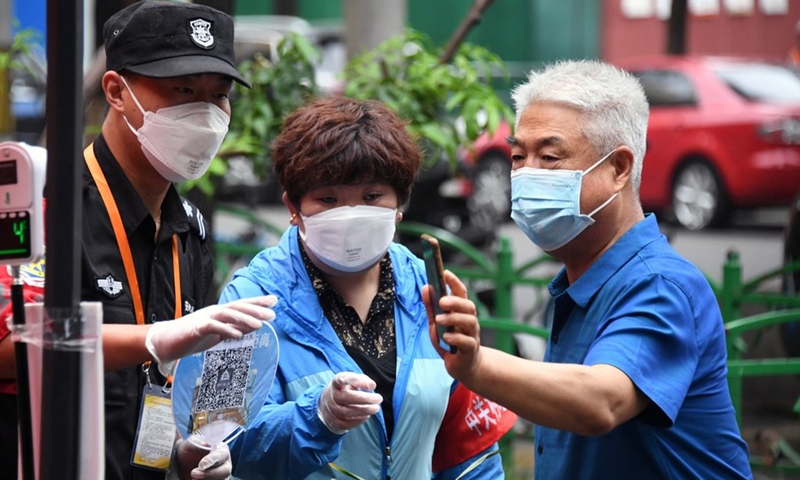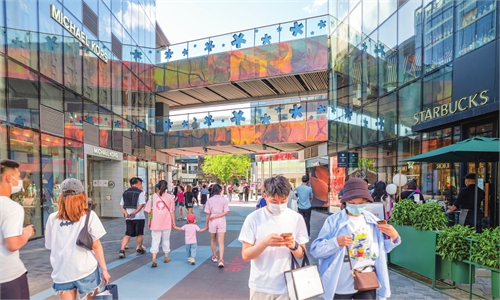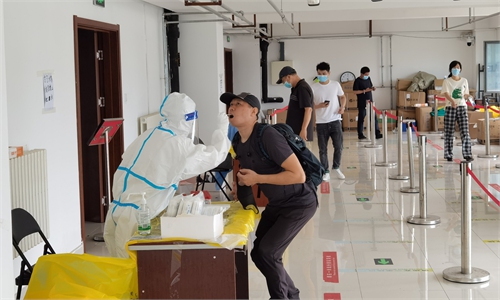
A resident scans a QR code to register his health status at the entrance of a community in Haidian District, Beijing, June 12, 2022. Photo: Xinhua
Beijing authorities have announced multiple new adjustments on COVID-19 prevention measures to further facilitate inbound travels to the city, including lifting restriction of residents from counties in border and port cities to enter and adjusting limits for travel from cities with confirmed cases, which have been hailed by analysts as a clear approach to implementing China's latest version of prevention and control protocols and setting an example on not simplifying prevention by restricting travelers.
People planning to travel to Beijing must have a green health code and a negative nucleic acid test obtained within 48 hours. Travelers are requested to submit to a nucleic acid test in 24 hours to 72 hours upon arrival. For commuters, the policy to check their nucleic acid test within 72 hours and green health code has not changed, Li Ang, deputy director from the Beijing Center for Disease Prevention and Control, told a press conference on Thursday.
To ensure the normal flow of travelers, Li outlined that, if a county reports one or more local cases, residents from other counties in the same city will no longer be banned from entering Beijing. Residents from counties in border and port cities will also not be restricted from entering the capital. People with a travel history to a county or a district which reported one or more cases in seven days remain strictly restricted from entering Beijing, down from the previous 14 days' record.
The national digital travel record has also shortened the travel history period from 14 days to seven days.
Moreover, the capital will also restore direct international commercial flights in phases in an orderly manner. Overseas travelers who entered China through ports in other cities can enter Beijing after "a 7-day centralized quarantine plus 3-day health monitoring at home" together with a negative nucleic acid test taken within 48 hours and a green health code.
According to the ninth version of the COVID-19 prevention and control protocols, Beijing requires close contacts to confirmed cases and overseas travelers who enter China via Beijing to have "7-day group quarantine plus 3-day health monitoring at home." Secondary contacts of confirmed cases will be asked to undergo 7-day home quarantine.
Aside from the adjustments, some prevention measures will be carried on, including checking negative nucleic acid tests within 72 hours and health code, taking temperatures when entering public areas, governmental institutions, or boarding public transport, and having regular nucleic acid tests to key industries, key areas and key groups.
According to new regulations released on Monday by Beijing authorities, starting from July 11, most people need to be vaccinated before entering certain public venues, including in-person training institutions, libraries, museums, cinemas, art galleries, cultural centers, sports venues, gyms, performance and entertainment settings and internet cafes.
In response to public concern over the newly released COVID-19 vaccination policy, the Beijing Daily cited an official from the Beijing Center for Disease Prevention and Control, as saying that "the ninth version of the COVID-19 prevention and control protocols has made it very clear that COVID-19 vaccination must be conducted under informed consent and voluntary participation. Beijing will strictly implement the principle."
Analysts praised Beijing's adjusting of prevention measures on inbound travels to Beijing since it has set an example to firmly implement the ninth version of the COVID-19 prevention and control protocols and any places that still simply prevention measures which restrict all travelers must consider further adjustment.
Aside from Beijing, many localities have adjusted prevention measures according to their epidemic situation. And to avoid a one-size-fits-all approach and to prevent local governments to take excessive prevention measures, 10 ministries, including the Ministry of Education, Ministry of Industry and Information Technology, Ministry of Transportation, Ministry of Agriculture and Ministry of Commerce released hot lines on Thursday for people to report issues.
Global Times


